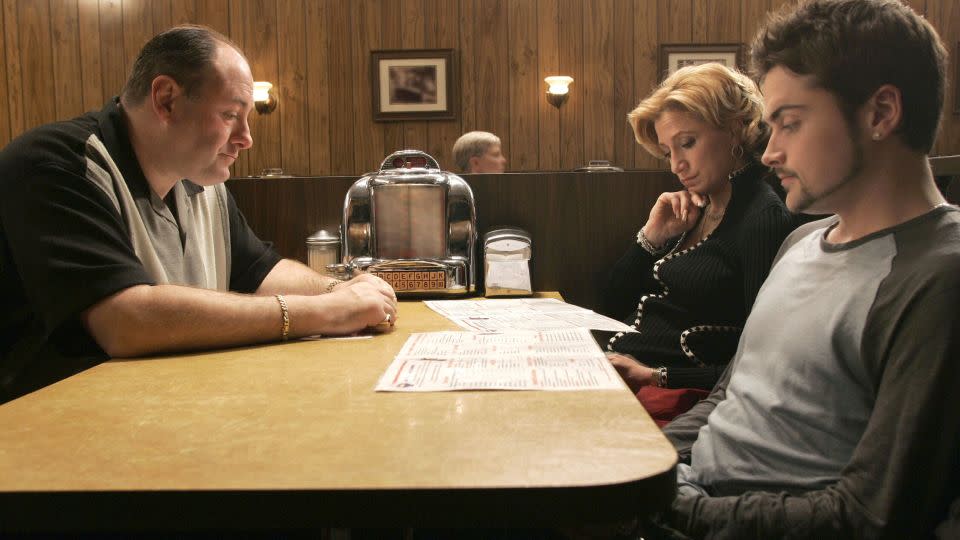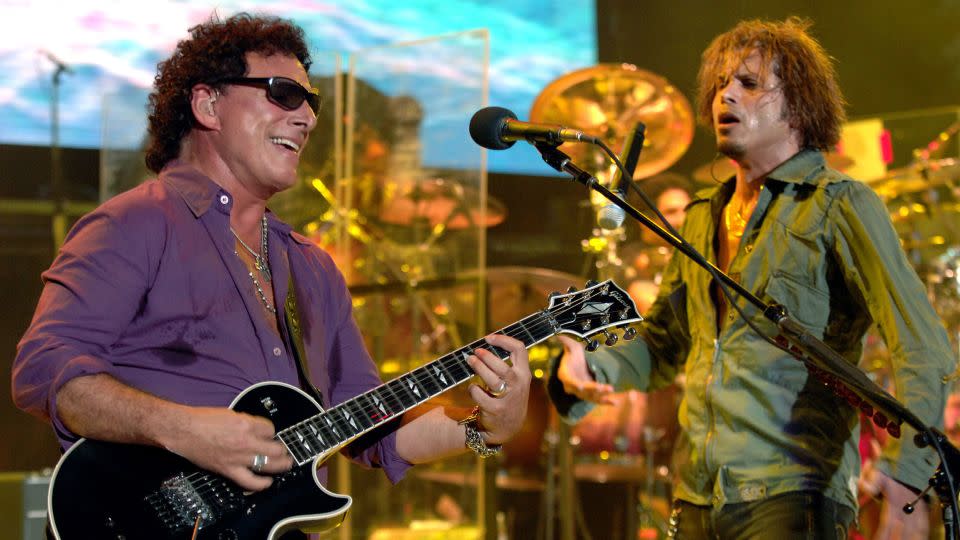I once dissed Journey in a concert review. Man, was I wrong
In August 2006, I was working as an arts writer for a newspaper when my editor sent me to review a Journey/Def Leppard concert at an outdoor amphitheater in suburban Salt Lake City. Thanks to the internet, I recently dug up my review.
“If this had been a battle of the bands, the British pop-glam-metal rockers would have blown Journey off the stage,” I wrote, calling Journey “a guilty-pleasure nostalgia act.” In five years, I predicted, “we may see these guys playing the state fair.”
Oof.
Almost 18 years later, Journey is one of the most beloved classic rock acts in the world. The band is currently wrapping up a triumphant 50th anniversary tour, then playing some dates in Europe before returning to the US for a series of summer stadium shows with … Def Leppard. They may be more popular than ever.
So much for my instincts as a music critic.
My reasoning back then was defensible. The San Francisco band, which formed in the ‘70s, hadn’t had a top-10 hit in more than 20 years and was struggling to find a true frontman after the departure of lead singer Steve Perry, known for his luminous voice.
But my timing was terrible. I was so wrong. And it’s all because of David Chase, some TV executives and one enduring song.
Journey’s surprising second act
Ten months later, in June 2007, millions of viewers were glued to the series finale of “The Sopranos” when Tony Soprano dropped some coins into a restaurant booth jukebox and dialed up Journey’s “Don’t Stop Believin’.” The song played out, almost in its entirety, for four tense minutes as Carmela and Anthony Jr. walked in, Meadow did some shaky parallel parking, Tony glanced repeatedly at the door and everyone waited for something bad to happen.

With its abrupt, cut-to-black ending, the episode had viewers talking for weeks and catapulted “Don’t Stop Believin,’” which came out in 1981, back up the digital sales charts. The song got another big boost two years later when it was featured in the pilot for Fox’s “Glee” and then six more times over the course of the series — bringing it, and Journey, to a new generation of listeners.
The song was already part of the culture. It had been featured in other TV shows, and the Chicago White Sox adopted it during their triumphant 2005 World Series run. But “The Sopranos” and “Glee” took it to a new level. By the end of 2009, it was the top-selling song of the 20th century.
And just like that, Journey was hot again.
For such a massive hit, “Don’t Stop Believin’” is sort of a curious tune. The chorus doesn’t come ‘til near the end, after all the verses AND the guitar solo. You can’t really dance to it. It starts out as a story about a small-town girl and a city boy meeting on a train, then dissolves into impressionistic vagueness (“streetlights,” “people”). And there is no such place as “south Detroit,” unless you count Canada.
But the song has undeniable magic as an inspirational anthem. Yes, I can journey to the big city on a train and fall in love! Yes, I can become a glee club star! Yes, I can enjoy dinner with my Mafia family in a Jersey restaurant surrounded by potential enemies and survive (maybe)!

Jonathan Cain, Journey’s keyboard player and the song’s co-writer, has said its can-do title came from words of encouragement his father gave him when he was a broke musician in Los Angeles in the 1970s.
“I was starving before I hit Journey,” Cain told CBS News. “And I was borrowing money from my father, who wouldn’t let me come back to Chicago. He said, ‘You stay there. Something good is gonna happen. Don’t stop believing.’ And he would always say that to me. ‘Don’t stop believing, Jon.’”
Over the past 15 years “Don’t Stop Believin’” has become a karaoke staple and a sing-along favorite. I’ve seen people in piano bars, at weddings and at bachelorette parties belting it out (“hold on to that feeeeeeeeeeeling!”) while thrusting their arms theatrically toward the sky. I may have been one of those people myself.
The song has even become associated with healing. In 2020, in the early weeks of the pandemic, a New York City hospital played “Don’t Stop Believin’” every time it discharged a recovered Covid-19 patient.
What I wrote in that review wasn’t fair
Is “Don’t Stop Believin’” a good song? By now, that’s almost beside the point. It’s become one of those cultural behemoths that transcends genres and decades and generations. Teens know it. Grandparents know it.
And yes, it’s been thoroughly overplayed. I’m a little sick of it, to be honest.
But on that August night in 2006 — before it became a THING — it felt just like another catchy song in Journey’s setlist. I don’t remember anything special about Journey’s show except that they were followed by Def Leppard, who brought a new level of noise and energy. For pure, visceral headbanging, it’s hard to compete with “Pour Some Sugar On Me.”
And that’s pretty much what I wrote in my review for The Salt Lake Tribune, plus a line about how Journey’s tunes were “marred by overblown arrangements and a sense that the band — what’s left of it — is clinging to fading glories.”

Um, yeah.
I think it’s important for journalists to admit their mistakes. Whatever you may think of Journey’s music, the band’s glories are still on display. In 2017, Journey was inducted into the Rock & Roll Hall of Fame.
As a critic, I evaluated the bands’ performances that summer night as I saw them. I still stand by that assessment. But it wasn’t fair to assume that I knew what lay ahead for Journey. Life throws curve balls. And we all deserve a chance at a second or a third act.
After that 2006 tour, Journey replaced their frontman with an unknown singer they found doing rock covers on YouTube. His name is Arnel Pineda, he grew up in the Philippines and he was once homeless. When Journey reached out to him, he thought it was a prank. Now he’s a rock star, with a soaring high tenor that evokes Perry’s from back in the day.
It’s a great story. Twists of fate can change the trajectory of a song, a rock band, a life.
Four decades after their heyday, Journey still plays to packed arenas around the world. Their songs remain radio staples. Forbes recently named “Don’t Stop Believin’” the biggest pop song of all time.
That kind of achievement and staying power deserve my congratulations and respect — even if it’s 18 years too late.
For more CNN news and newsletters create an account at CNN.com

 Yahoo Sport
Yahoo Sport 




































































